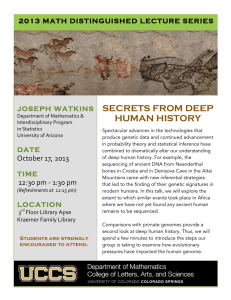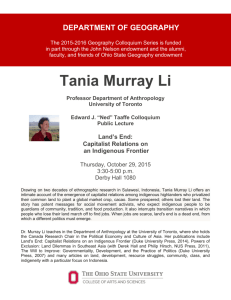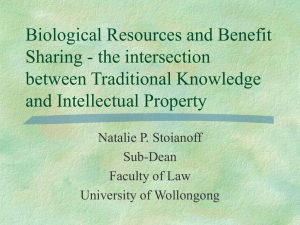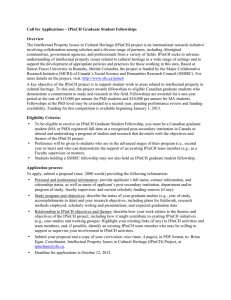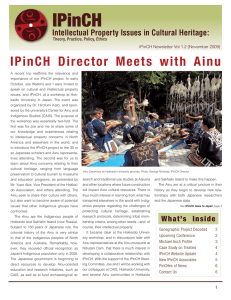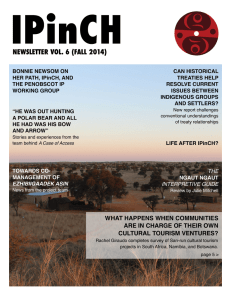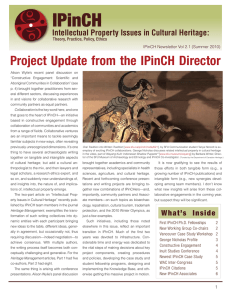DNA & INDIGENEITY The Changing Role of Genetics in Indigenous Rights, Tribal
advertisement
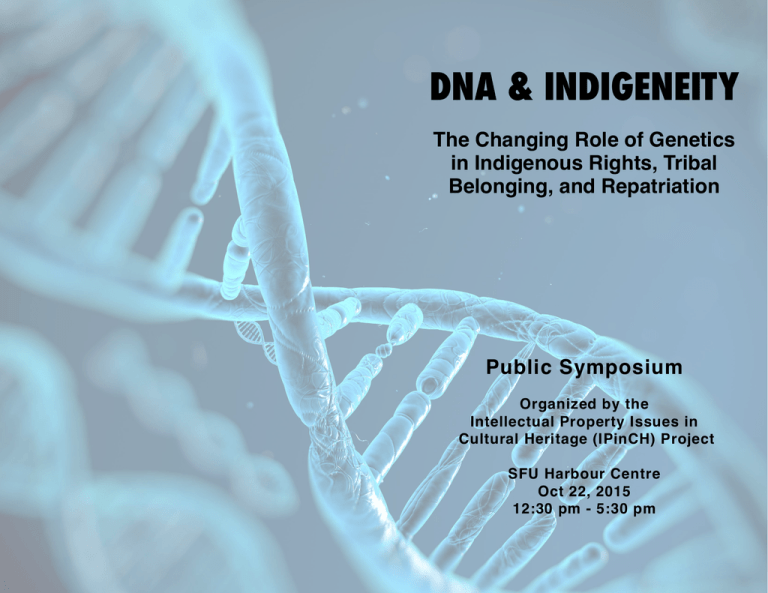
DNA & INDIGENEITY The Changing Role of Genetics in Indigenous Rights, Tribal Belonging, and Repatriation Public Symposium Organized by the Intellectual Property Issues in Cultural Heritage (IPinCH) Project SFU Harbour Centre Oct 22, 2015 12:30 pm - 5:30 pm PROGRAM ------------------------------------------------------------------------- 12:30 - 1:00 pm: Symposium Welcome ------------------------------------------------------------------------George Nicholas Dr. George Nicholas is a Professor of Archaeology at Simon Fraser University (SFU), in Burnaby, British Columbia, and serves as the Director of the Intellectual Property Issues in Cultural Heritage (IPinCH) Project. Victor Guerin Victor Guerin is a member of the Musqueam First Nation and speaker of həәn̓ q̓ əәmin̓ əәm̓ , the Musqueam dialect of the Central Coast Salish language. He is past coordinator of the Musqueam Language and Culture Program and has worked as a cultural researcher and tour guide at the UBC Museum of Anthropology. He works with elders from his own and sister communities learning about the cultural beliefs and traditions of his people including oral history, traditional narratives, songs and dances. ------------------------------------------------------------------------- 1 : 0 0 - 2 : 1 5 p m : Co n s t r u c t i n g B i o g e n e t i c I d e n t i t i e s— What are the Limitations? ------------------------------------------------------------------------- Bringing the Ancient One Home: Genetic Data and the Case for Repatriating Kennewick Man Armand Minthorn The final resting place of Kennewick Man, or the Ancient One, remains a highly debated question. This presentation will tell the story of Kennewick Man from the perspective of the Confederated Tribes of the Umatilla and make the case for his repatriation. Armand Minthorn is a Religious Leader and member on the Board of Trustees for the Confederated Tribes of the Umatilla Indian Reservation. Armand is a vocal advocate for the repatriation of The Ancient One (also known as Kennewick Man). The Risks and Benefits of Inferring Relatedness, Identity, and Cultural Affiliation from Ancient DNA Deborah Bolnick Recent advances in genomic technologies have made it increasingly feasible to collect genetic data from ancient human remains. This presentation will consider: 1) the benefits and risks of using ancient DNA to establish cultural affiliation and substantiate repatriation or land claims; and 2) the importance of grounding such claims in what we know more generally about human genetic diversity. This presentation will explore a key question: What do—and don’t—genetic analyses in these studies tell us about relatedness, identity, and shared culture? Several high profile studies will be examined to illustrate these issues, particularly the need to contextualize the data from these single genome studies. Dr. Deborah Bolnick is an Associate Professor of Anthropology and affiliated with the Population Research Center at the University of Texas at Austin. Her research examines genetic variation in Native American populations and how it has been shaped by culture, history, and geography. Lives in Motion: Cautionary Notes on Using Human Biology to Infer Identity, Cultural Affiliation, and Ancestry Alan Goodman While it is typically understood that identities are multiple and fluid, the same instability and fluidity applies to human biology. Biological variation is high within any group and, over time, in phenotypes such as height and head shape. A review of craniometric studies used to identify Native Americans in contemporary forensic research show just how variable crania within one group can be. The instability of biology makes particularly problematic the use of “racial categories” and shows that the notion of closed and isolated groups is typically a myth. This presentation highlights the implications of using biology to suggest the identity and ancestry of ancient ones, specifically Spirit Cave and Kennewick Man. Dr. Alan Goodman, Professor of Biological Anthropology, teaches and writes on the health and nutritional consequences of political-economic processes such as poverty, inequality, and racism. His current research includes projects on malnutrition in Mexico and Egypt, and the stresses of slavery in New York. ------------------------------------------------------------------------- 2:15 - 2:30 pm: Break ------------------------------------------------------------------------------------------------------------------------------------------------- 2 : 3 0 - 3 : 4 5 p m : B i o g e n e t i c s , Ju s t i c e , a n d t h e Re p a t r i a t i o n o f H u m a n Re m a i n s ------------------------------------------------------------------------- Genetics, Identity, and Justice Daryl Pullman Whether and how genetic information should be utilized in determining questions of identity is contingent to some degree on issues of justice. However, just as it is difficult to pin down the question of what constitutes ‘identity’ –either individually or corporately— so too with the question of what constitutes justice. Drawing on some recent cases from Newfoundland and Labrador (e.g. repatriation of Beothuk remains; membership in the Qalipu Mi’kmaq ‘landless’ tribe), this presentation explores differing notions of identity (e.g. genetic, cultural, and otherwise) as well as various conceptions of justice (distributive, compensatory, retributive, restorative) relating them to issues of repatriation, tribal identity, and land claims. Dr. Daryl Pullman is a Professor of Medical Ethics in the Faculty of Medicine at the Memorial University of Newfoundland. He has published widely on a variety of issues in research and clinical ethics, and has a particular interest in issues related to genetic research and therapy. Repatriation and the Limits of Genetic Identity Dorothy Lippert In the United States, the National Museum of Natural History repatriates human remains, funerary objects, sacred objects and objects of cultural patrimony to federally-recognized tribes. Documenting the ties between existing tribes and ancient peoples can utilize biological constructions of identity, but there are limits to this type of analysis given that tribes are political entities as well as cultural ones. This presentation will use case studies to show how difficult repatriation would be if it only relied on genetic constructions of identity. Dorothy Lippert is Choctaw and works in the Repatriation Office of the Smithsonian National Museum of Natural History. Dorothy has written extensively on the subject of repatriating human remains and archaeological ethics. Provenancing Indigenous Human Remains for Repatriation Purposes: A Case Study for Exploring Perceptions of Biological and Social Identity Cressida Fforde In Australia, DNA research has yet to be used for the purposes of repatriating Indigenous ancestral remains, but it is beginning to be discussed, particularly in relation to those remains with no, or little, provenance information available within archival sources. This paper considers the use of ‘biological’ markers of identity in repatriation to illuminate perceptions of Indigenous identity, the need for greater sophistication in research translation, and the implications (both real and potential) if greater understanding is not achieved and communicated. Dr. Cressida Fforde joined the National Centre for Indigenous Studies (based at Australian National University) as its Deputy Director in November 2011. Her primary research focus has been the history of the removal and subsequent study of Indigenous human remains by European institutions within the ‘race’ paradigm in the 19th century and campaigns to secure their return. ------------------------------------------------------------------------- 3 : 4 5 - 5 : 0 0 p m G e n e t i c Re s e a r c h w i t h I n d i g e n o u s Co m m u n i t i e s : Cu r r e n t Ch a l l e n g e s a n d F u t u r e Directions ------------------------------------------------------------------------- Anthropology, Genomics, and Whiteness Kim TallBear During the 19th century, the American School of Anthropology enfolded Native peoples into their histories, claiming knowledge about and artifacts of these cultures as their rightful inheritance and property. Highlighting several cases, this talk describes how similar enfoldments continue today— despite most contemporary scientists’ explicit rejection of hierarchical ideas of race. This talk highlights extra-legal strategies that can address tensions between indigenous peoples and genome scientists and their facilitators—ethicists lawyers, and policy makers. Dr. Kimberly TallBear is an Associate Professor at the University of Alberta in the Faculty of Native Studies. She is an enrolled member of the Sisseton-Wahpeton Oyate in South Dakota, descended from the Cheyenne & Arapaho Tribes of Oklahoma, and raised on the Flandreau Santee Sioux reservation in South Dakota and in St. Paul. Dr. TallBear’s research focuses on the historical and ongoing roles of science and technology (technoscience) in the colonization of indigenous peoples and others. Exploring Indigenous Identity at the Intersection of Medical Genetics Discourses Rosalina James Beginning in the early twenty-first century, the genomic age has seen academic interests expand beyond Indigenous global migrations to more medically-driven population genetic research. In this environment, scientific narratives tend to privilege race-based biological explanations for physical and mental health phenomena. Similarly, academic frameworks for individual and group identity are increasingly described through a lens of genetic-derived logic over the cultural, political, historical, and societal conditions that shape social beings. Propelled by the promise of using genetic information to address health disparities, indigenous people once again must weigh the benefits of participation in genetic research with potential risks. This presentation explores how indigenous people construct identity at the intersection of medical genetics discourses. Dr. Rosalina James is an Assistant Professor in the Department of Bioethics and Humanities at University of Washington. Her interests include developing strategies responsive to community interests in research, assessment of community-based participatory research partnerships, and translational research ethics. Partnerships with First Nations of British Columbia on Studies that Include DNA Analysis Ripan Malhi Over the past decade we have partnered with First Nations of British Columbia on projects that include DNA analysis of both living community members and ancestors, the latter through the analysis of ancient skeletal remains. These partnerships, based on mutual respect and communication, were created in the wake of antagonistic relationships elsewhere between scientific researchers and indigenous peoples that impeded genomic knowledge among Native American community members. We facilitate these conversations through talks in First Nation communities and a one-week “hands on” workshop for indigenous community members called the Summer Internship for Native Americans in Genomics (SING). Today we discuss how First Nations are using genomics as a tool to further their interests, while employing safeguards to minimize any potential risks. Dr. Ripan Malhi is an Associate Professor in the Department of Anthropology at the University of Illinois at Urbana-Champaign. Based at the university, the Malhi Molecular Anthropology Laboratory generates DNA variation data from different genetic systems to infer evolutionary history of populations and species. ------------------------------------------------------------------------- 5:00 - 5:30 pm: Discussion A c k no w l e d g e m e nt s The DNA and Indigeneity symposium is organized by the Intellectual Property Issues in Cultural Heritage (IPinCH) project, based at Simon Fraser University. The Symposium Planning Committee includes George Nicholas, Brian Egan, Alexa Walker, Daryl Pullman, Alan Goodman, and Dorothy Lippert. IPinCH is an international collaboration of over 50 scholars and 25 partnering organizations concerned with the theoretical, ethical, and practical implications of commodification, appropriation, and other flows of knowledge about the past, and with how these may affect communities, researchers, and other stakeholders. For more information about IPinCH, visit: www.sfu.ca/ipinch. This event was made possible by financial support from the Social Sciences and Humanities Research Council of Canada (SSHRC) through an MCRI research grant to IPinCH Project Director Dr. George Nicholas, a SSHRC Connections Grant to IPinCH’s Bioarchaeology, Genetics, and IP Working Group, and generous support from Simon Fraser University.
